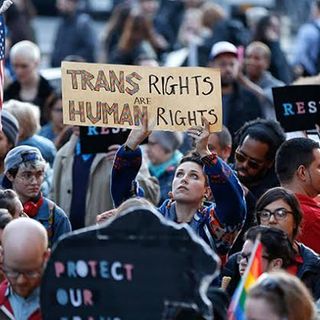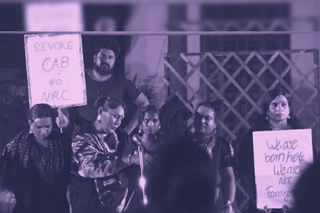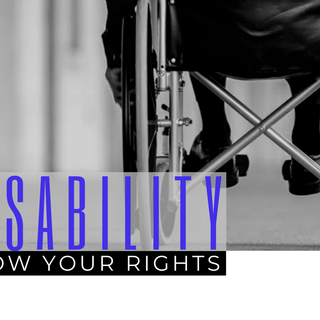
How the NRC‑CAA Will Affect Women, Transgender People and People With Disabilities
In a patriarchal society, the privilege of having documents depends on gender, ability and caste.

The deadly combination of the National Population Register (NPR) — a database of Indian citizens that contains demographic and biometric data, subsequent National Register of Citizens (NRC) — an exercise that will require Indian citizens to prove their or their family’s citizenship going as far back as 1971 through documents, and the Citizenship Amendment Act (CAA) — a recent law that bans Muslim migrants from neighboring Muslim-majority countries such as Pakistan, Bangladesh, and Afghanistan, has foreshadowed a grim future for Muslims in the country. So much so, the entire nation is now awash with angry, determined protesters willing to brave ongoing police brutality to demonstrate the might of their citizenry to the BJP-led government.
The NRC, if implemented throughout the nation as hinted by Home Minister Amit Shah on many occasions, has the power to render minority groups such as Muslims, transgender people, and Dalits, Bahujans and Adivasis, stateless. If they are unable to drum up adequate documentation to prove their citizenship according to the NRC’s definitions, they could be sent to detention camps already nearing completion in many parts of the country.
The list of documents, as informed by the NRC exercise recently conducted in Assam, include proof of having voted in a past election, land and tenancy records, government-issued license or certificate, bank or post office accounts, birth certificate, state or university educational certificate, passport or a life insurance policy. Furthermore, if and when a nationwide-NRC takes place, the list of documents could be entirely different; while no clarity has been provided by the government on what they could be, by several accounts of the ruling party, Voter ID cards, Aadhar cards, and even passports will not be counted as valid proofs of citizenship.
Almost all of these certificates require individuals to have agency over their functioning in Indian society — a privilege that has never been accorded to many groups in the country.
As #RepealCAA and #RevokeNRC protests take over the nation’s social and political consciousness, there are layers to the NPR-NRC-CAA that speak to the marginalization of several minority or disadvantaged groups besides Muslims — mainly, women, transgender people, people with disabilities and Dalits, Bahujans and Adivasis. How does the NRC-CAA combination further subjugate these already marginalized groups in society?
How the NRC-CAA affects women
In November 2019, a nine-person team from advocacy organization Women against Sexual Violence and State Repression (WSS) embarked on a fact-finding mission in Assam — the only Indian state (yet) where NRC has been implemented — to study its effects on women.
“Proving citizenship under the NRC relies largely on land, lineage, education and the availability of documents pertaining to these,” the WSS survey found. “In a patriarchal society, women in general, and women from marginal and oppressed communities in particular, have historically and traditionally been excluded from entitlements to land and access to education and have almost no documentation to prove their existence as citizens.”
Going down the laundry list of documents the BJP-led Assamese government accepted as proof of citizenship, a larger problem arises: many women go their entire lives without being let to cast their votes. In some cases when they have exercised their democratic rights, there have been reports of their votes suddenly disappearing from the electoral roll, making the requirement to produce electoral roll documents an unfair burden on women. Women, especially from marginalized class and caste groups, are not allowed to own land, have a bank account, go to school and get an educational certificate, or have a passport and own insurance — all of which are requirements to make it to the NRC.
Married women, especially, are at risk of being excluded from the NRC — for the sole reason they don’t know whether to provide documents of the lineage of their in-laws, or of their own parents.
“Women who thought their legacy means their in-laws’ legacy have filed these forms. Now legacy once given is frozen. You cannot change it. You cannot make any corrections. So their name is not there on the list,” head of the survey, Nisha Biswas, explained to The Citizen, adding there is no provision to provide revised documents in the NRC — if you make a mistake, you could be labeled as “illegal immigrant” or “foreigner” without any opportunities for redressal. The WSS survey reveals not a single woman from out of Assam who married an Assamese man was included under the latest NRC list, simply because they erroneously provided documentation for the families they married into and were now a part of.
Related on The Swaddle:
From Teachers to Textbooks: Gender Stereotypes in Indian Schools
Even if, by random chance, women do have these documents, The Citizen reports these women are often not allowed to go to hearing centers to submit documents and prove their citizenship by themselves, adding in one more conditional, often insurmountable layer for them to be registered under the NRC.
“There they were expected to use a language that is neither their own, nor one they were ever allowed to learn to read, and testify to a lineage they have been disinherited [or distanced] from, all to secure a place in a family ‘tree’ that cements the patriarchal family all over again,” according to the WSS survey.
Now, if a woman does become stateless i.e. unable to prove her citizenship and therefore not included in the NRC, she could, ideally, appeal to gain back her citizenship through the CAA — only if she is Hindu, Sikh, Jain, Christian, Buddhist or Parsi. If she’s Muslim, she is not only rendered stateless by the NRC but also banned from redressing the issue through the CAA, rendering her an illegal immigrant.
How the NRC-CAA affects transgender people
The WSS survey also shows the transgender population in Assam — 2,000 per estimates, but likely more — remains entirely unlisted in the final NRC list.
“What happens is that most are either abandoned at birth or disowned by their families later in life. Some start to feel differently from their ascribed gender identity. They leave their homes and start living with fellow trans people. They live as families within their own community. What I mean to say is that most have no connection with their actual families and parental homes,” trans rights activist and lawyer, Swati Bidhan Baruah, told The Wire. “So, it is extremely difficult to establish their link with families and provide proof that they belong to families which have been living in Assam before March 25, 1971. For that, they need to connect with their families and obtain certain documents from them. With the familial connections snapped and many not welcome at their homes, any available chance of establishing that they are Indians and residents of Assam becomes difficult.”
In addition, for many transgender people whose names ended up appearing in Assam’s NRC, the exercise was futile — as the list contained their birth-assigned, or dead, name and gender. Post the 2014 NALSA judgment that declared transgender people to be the third gender entitled to fundamental human rights as granted under the constitution, many transgender people changed their name and gender more suited to their identity, in government documents. But under the NRC, legacy documents often don’t reflect that transition, which leaves many members of the trans community neither here nor there.
Related on The Swaddle:
What a Transgender-Friendly Healthcare System Would Look Like
In addition, the bureaucratic process itself is unwelcoming of trans people. In Assam, the NRC forms forced transgender people to check off either a male or female gender, thus forcing them to adhere to a gender binary they might not ascribe to. Even while interacting with the officers in charge of handling people’s documents, Bidhan Baruah said the process was discriminatory, with many trans people told to “come later” because officials “were busy.”
Once again, if trans people are rendered stateless by the NRC, they would have no course for redressal if they also happen to be Muslim.
How the NRC-CAA affects people with disabilities
The United Nations’ Committee on the Rights of Persons with Disabilities (CRPD) in an initial report on India earlier this year expressed concern for the people with disabilities that would be declared stateless under the NRC. The stigma surrounding disability often outcasts people with disabilities from their families, thus making the process of tracking down documents required to prove citizenship arduous, and depending on the kind of disability, almost impossible.
Related on The Swaddle:
Know Your Rights: Disability Laws in India
In addition, the CRPD report notes the hearing centers, detention camps and all the bureaucratic processes contained within these institutions have not been made accessible to people with physical and mental disabilities, which keeps out certain groups and robs them of the opportunity to submit their documents. Lastly, many people with cognitive disabilities are not trusted or let to gather, handle, and submit their own documents — alternative processes for them have not been encouraged or established.
How the NRC-CAA affects people from scheduled castes and scheduled tribes
In Jharkhand, a state where the tribal population totals 86,45, 042, for example, “Adivasis enjoy land rights by tradition and most of their land is vested with village heads hence it will be difficult for them to show individual ownership of land,” activists told The Telegraph at an anti-NRC rally in Ranchi. By virtue of living in Scheduled Areas under the Constitution, many Adivasi tribes do not have the same document and ownership processes as required by the NRC, making the bureaucratic process inapplicable to Adivasis, and therefore unfair and exclusionary.
In addition, if Adivasis are rendered stateless under the NRC, it is unlikely they would be able to reapply for citizenship under CAA — their religious proclivities largely fall out of the Hinduism, Sikhism, Jainism, Buddhism, Zoroastrianism and Christianity limits set by the CAA.
Calling the NRC-CAA a tool to further subjugate Bahujans, Bhim Army chief Chandrashekhar Azad writes for The Wire, “In India, many tribal people still live a nomadic life without any document or identity certificate. It’s the same with all the landless people who are still dependent on the landlords that they have been working for generations. There are daily wagers, those who roam around in search of work, those who don’t have a permanent residence — from where will they bring the documents? Dalits living in slums are forced to flee their shanties every time there is a heavy downpour — from where will they bring the papers? Tribal people, who still don’t have access to electricity — what citizenship proof will they furnish?”
At the end of the day, the fight against NRC-CAA needs to be intersectional — along religious lines, class and caste lines, and across genders, because its negative consequences clearly are.
Rajvi Desai is The Swaddle's Culture Editor. After graduating from NYU as a Journalism and Politics major, she covered breaking news and politics in New York City, and dabbled in design and entertainment journalism. Back in the homeland, she's interested in tackling beauty, sports, politics and human rights in her gender-focused writing, while also co-managing The Swaddle Team's podcast, Respectfully Disagree.
Related


Know Your Rights: Disability Laws in India
